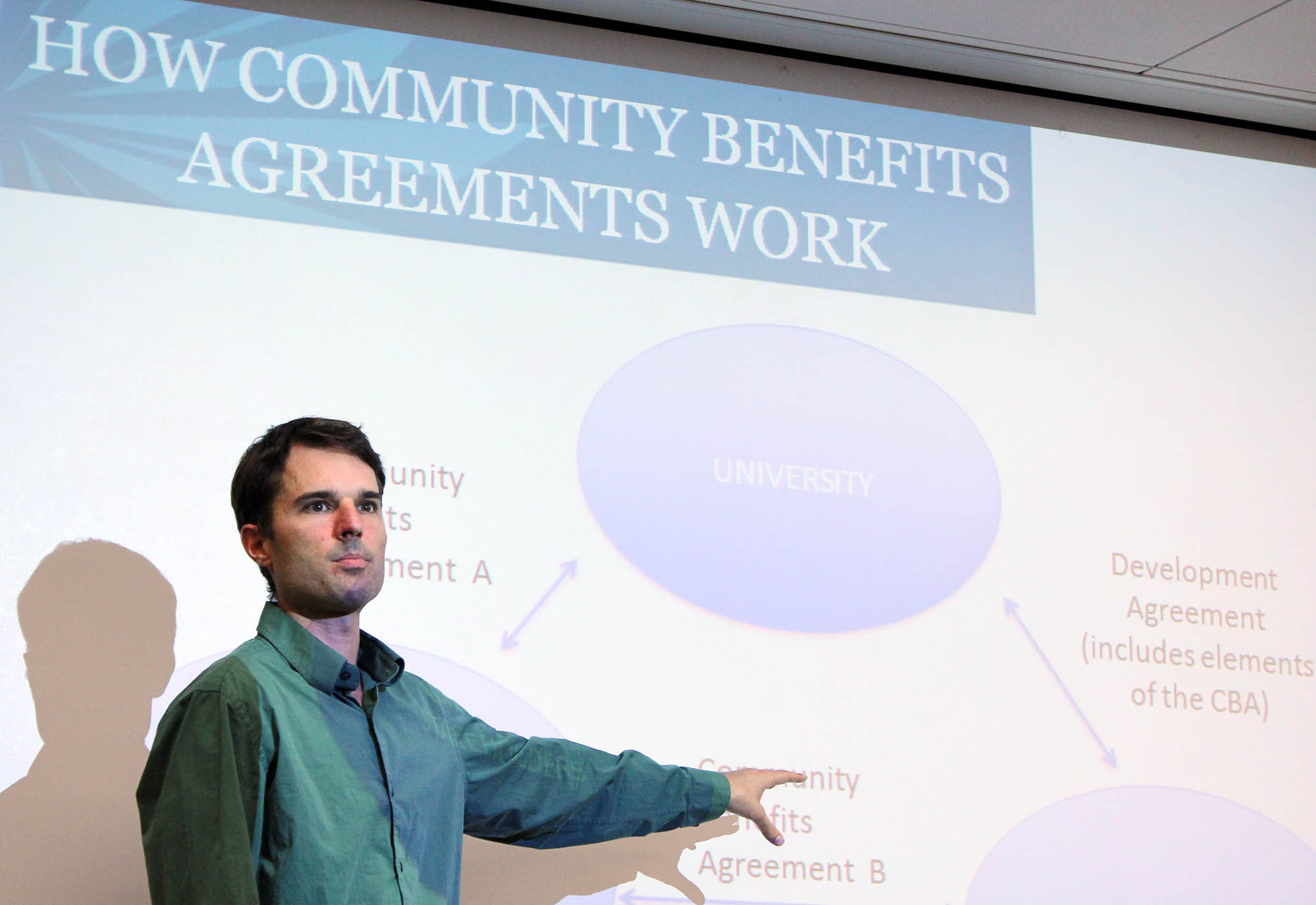
by Rasheed Shabazz | January 21, 2014
Richmond community leaders called for housing to be on agenda for Berkeley Global Campus
The working group tasked with making recommendations for the proposed Berkeley Global Campus in Richmond will add housing and concerns about displacement to future discussions about the long-term partnership between the city and the university.
One week after Chancellor Nicholas Dirks shared his vision for the new campus, local activists and leaders expressed concerns about residential displacement as a result of the new development at the Dec. 18 meeting of the Richmond Community Working Group held at the Richmond Field Station. The group also shared findings from a recent study about the project, frequently being called the largest since the building of the Richmond shipyards of World War II that transformed the East Bay city into a boomtown.
“There is a concern of being pushed out of the community when rents go up, more investment comes in, and people are displaced,” said Christina Hernandez, an organizer with the Contra Costa Interfaith Supporting Community Organization (CCISCO). Fears of residential displacement as a result of the development have been a major community concern for the past year.
UC Berkeley Chancellor Dirks and the Lawrence National Laboratory Director previously agreed to community benefits in the areas of local hiring, procurement practices, education and workforce development, in a joint statement on community partnerships. The working group agreed to also discuss housing.
Working group member Tamisha Walker, co-founder of the Safe Return Project, suggested a community member should co-chair the working group to provide inclusive leadership to the group. “We need someone from the community to be sitting at the table with you, developing the agenda with you,” Walker said. The request had also been presented to the Chancellor during his Dec. 11th meeting in Richmond. A commitment has not been made to allow a community representative co-chair the Community Working Group, now chaired by one LBNL and one UCB representative.
The meeting primarily focused on defining the mission of the working group and its planning process. An ad-hoc committee will revise the working group’s mission and charter.
A hanging question was whether the working group would be able to develop recommendations for the university before the university is positioned to sign an agreement with a developer. In December, the chancellor committed to reach an agreement with Richmond community stakeholders before the university signs an agreement with a developer. It will take six months until the university will be ready to commit to a developer, according to Terezia Nemeth, development manager for the new campus. A six-month timeline from December would end in May. The working group will begin its five monthly meetings starting in February.
Anchor Richmond Presentation
 Community representatives also presented findings from the Haas Institute’s Anchor Richmond report, a study focused on opportunities and challenges with the new development, published in October.
Community representatives also presented findings from the Haas Institute’s Anchor Richmond report, a study focused on opportunities and challenges with the new development, published in October.
Anchor Richmond emerged from 45 community meetings; research meetings with various organizations, and benefited from input from door-to-door canvassing that involved over 300 people, according to Hernandez. The report focuses on four areas: education, housing, jobs and community wealth.
The report, published by the Haas Institute, is available at diversity.berkeley.edu/anchor-richmond.
Many community members hope that locating a Berkeley-affiliated campus in Richmond will increase educational opportunities for local youth and adults. African American and Latino youth in the city lack opportunities for STEM (Science, Technology, Engineering and Math) education due to the lack of equipment, teachers and proficiency, according to the report. The report recommends UC invest in curriculum development, faculty training and mentoring, as well as internships.
Housing concerns were also central to the presentation. “Once this campus is built, it is not a secret that people are going to want to live closer,” Melvin Willis, a Richmond resident and organizer with the Alliance of Californians for Community Empowerment (ACCE) said. “I’m low income. I know I don’t want to get pushed out,” he said.
The increased demand will impact renters and homeowners with increased costs. Richmond already has a housing crisis with over 40 foreclosures per month and over half of homeowners “underwater,” or with mortgages larger than their homes’ values. Additionally, many renters are over-burdened, without disposable income for any rent increases, Willis added. The report recommends UC help protect homeowners and tenants by investing in a homeownership trust, a rental assistance program, along with a Just Cause Eviction ordinance.
Eli Moore, program manager for the Haas Institute, emphasized the opportunities with the development to reduce unemployment, especially for youth and the formerly incarcerated, as well as eliminating racial wealth gaps. He noted that few of UC Berkeley’s current procurement monies, or business purchases went to Richmond. Moore recommended an “Anchor Opportunity Study” to examine institutional data and procedures to see how the university, as an anchor institution, could ensure community stability and leverage community assets in Richmond to promote business and eliminate inequality.
The 18-member working group was established in September and meets monthly. Members were appointed for two-year terms. Members represent a cross-section of areas including local government, community-based groups, faith-based organizations, business, labor, education, youth, philanthropy, and UC affiliates.
The next working group meeting will be at 6:30 pm, Thursday, Feb. 26 at the Richmond Field Station.
More information:
Anchor Richmond reports calls on UC to adopt inclusive development policies for Berkeley Global Campus by Rasheed Shabazz
Creating Anchors: Ensuring Community Stability Through UC Berkeley as an Institution by Sharanya Shiram
Summary of Working Group meeting notes by Chancellor’s office

